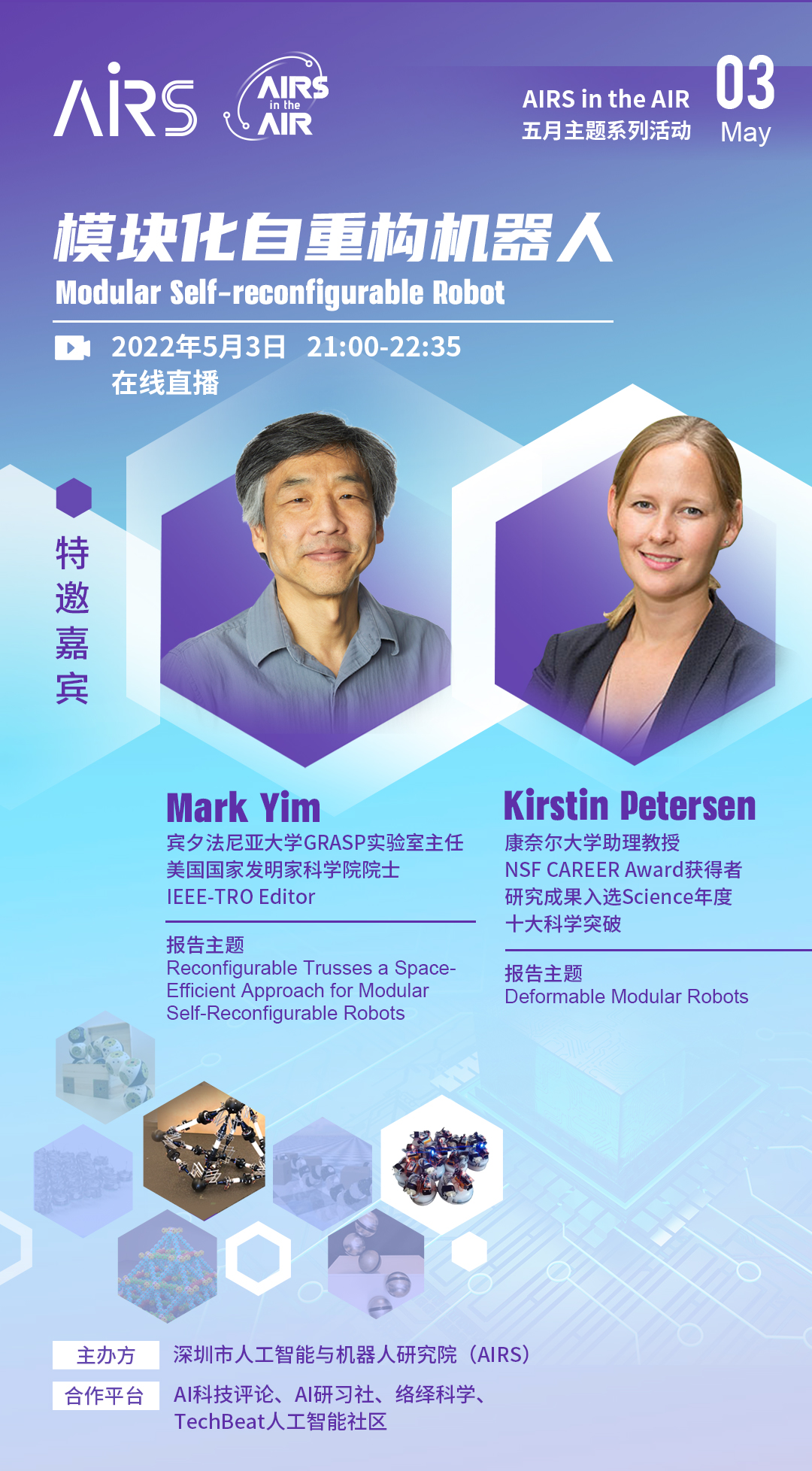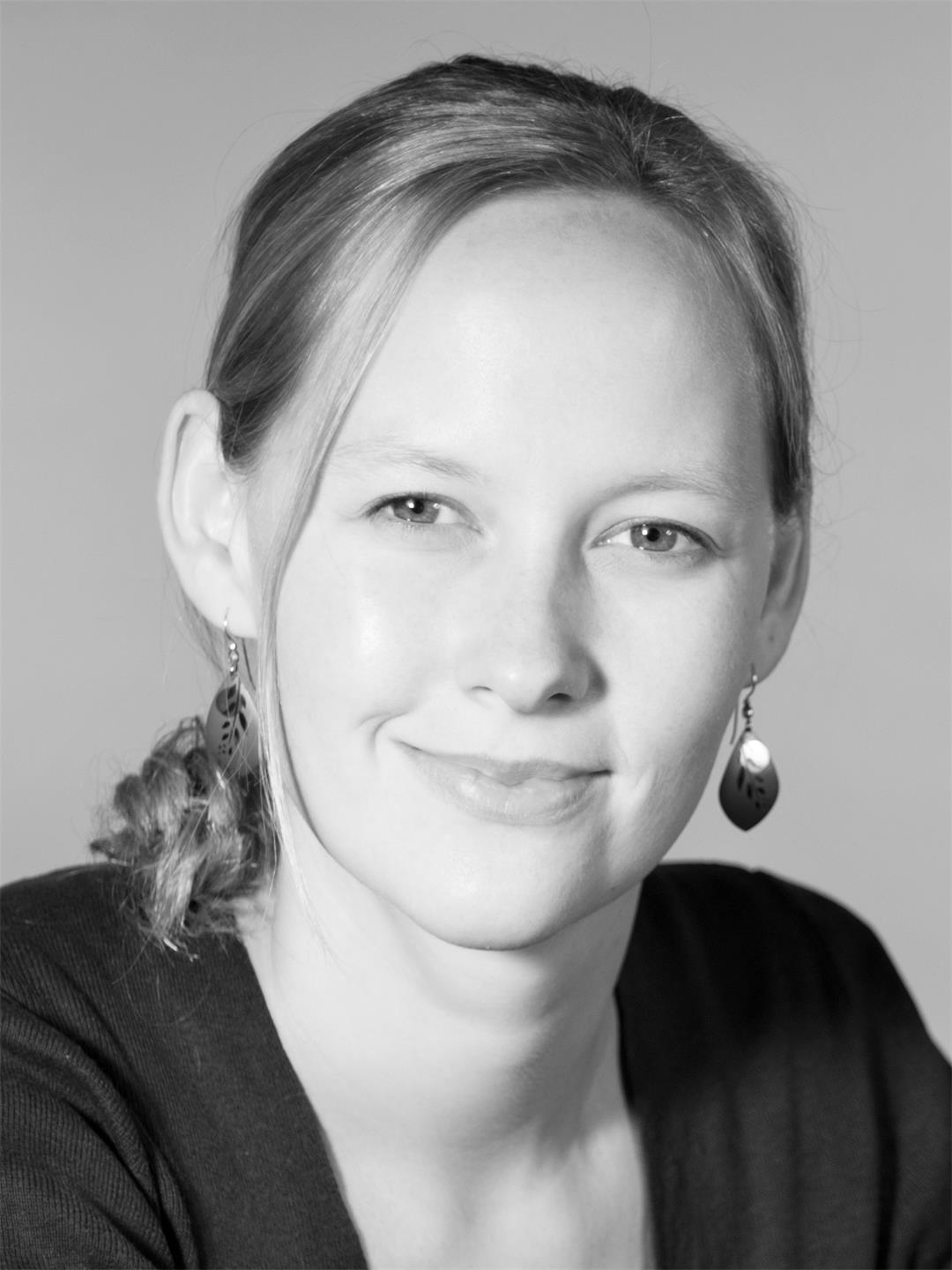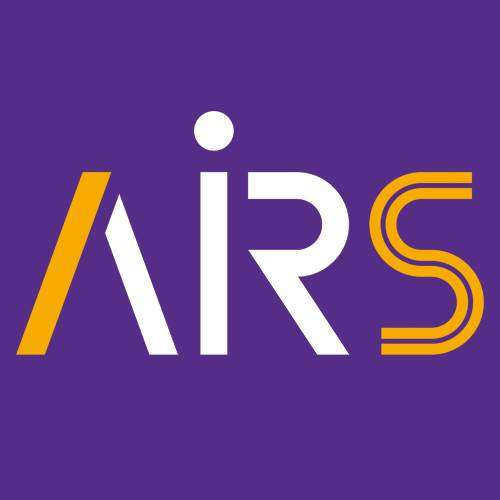

收起
活动内容收起

模块化自重构机器人是近年来的研究热点。它是一种由同构单元组成的机器人系统,可根据不同任务和环境转变为合适的构型,特别适用于工作环境变化大、操作任务复杂的场合,在抢险搜救、反恐侦察、太空探索等领域有着广阔的应用前景。
为了加强科研成果和知识共享,促进本领域的学术交流与合作,助力理论创新和技术发展,AIRS in the AIR 五月系列活动邀请世界顶级学者围绕“模块化自重构机器人”开展讲座。本月讲座将带大家回顾模块化可重构机器人的发展历史,深入探讨目前技术发展面临的挑战与解决方案,并详细介绍如何通过研究,让机器人更好地服务于人类,以及推动社会发展。
*讲座主题1 :
Reconfigurable Trusses a Space-Efficient Approach for Modular Self-Reconfigurable Robots/
可重构桁架:空间高效的模块化自重构机器人
摘要:
Modular Self-Reconfigurable Robots are systems with repeated units that can rearrange themselves to adapt to changing environments, conditions or tasks. They hold great promise for versatility (changing configuration to whatever task is required), robustness (including self-repair) and low cost (using economies of scale). In over three decades of study, the first promise of versatility has borne out, a large number of tasks have been demonstrated, and the second one of robustness looks to be feasible and demonstrated in limited cases, the last one of low cost seems to be difficult or ill-founded. One reason is that tasks that require larger workspaces typically require larger numbers of modules, and the inefficiencies typically grow with the number of modules. The variable topology truss (VTT) is an approach where the size of the robot can change without changing the number of modules and the topology of the resulting truss can also change. I will present a short review of modular reconfigurable robots we've worked on from the past thirty years and also talk about the technical challenges of the VTT system currently in development.
模块化自重构机器人是一种由同构单元组成的机器人系统,它们可以调整自身以适应不断变化的环境、条件或任务,在多功能性、鲁棒性和低成本方面有着巨大的潜力。在过去30多年的研究中,通过大量的任务,它们在多功能性方面的潜力得到了证实;鲁棒性则在有限的情况下得到验证;而低成本却似乎难以实现。其中一个原因是,大工作空间的任务通常需要更多的模块,低效性也因此而增加。可变拓扑桁架(VTT)是一种可以不用改变模块数量就可改变机器人尺寸的方法,由此产生的桁架的拓扑也可以改变。我将简要回顾一下我们在过去30年中研究的模块化可重构机器人,并讨论目前正在开发的VTT系统的技术挑战。
讲座嘉宾:
Mark Yim is the Asa Whitney Professor of Mechanical Engineering in the
School of Engineering and Applied Science. Yim is an internationally
recognized scholar in the field of robotics. He is the director of the GRASP
Lab, the oldest robotics research laboratory in the country established in
1980. His research group designs and builds a variety of
electromechanical hardware. His group has demonstrated robots ranging from a
humanoid displayed at the Philadelphia Museum of Art to transforming robots
that can change their shape to the smallest self-powered flying robot in the
world. His current research focus includes reconfigurable truss robots that can
help in search and rescue operations, swarms of boats that can attach together
and reconfigure their shape, swarms of small flying robots that can group into
shapes that interact with humans and swarms of microscopic robots that can
build structures. His other research interests include product design, robotic
performance art, novel locomotion, low-cost manipulation, in the search and
rescue as well as healthcare applications.
Honors include the Lindback Award for Distinguished Teaching (UPenn's highest teaching honor); induction to MIT's TR100 in 1999; induction to the National Academy of Inventors in 2018. He has over 200 publications and over 50 patents issued (perhaps the most prominent patents are related to the video game vibration control which resulted in over US$100 million in litigation and settlements). He has started three companies, one in robotics, one medical device company making a steerable needle and one focusing on thermal storage to reduce carbon impact.
Prior to Penn, he spent ten years in industry including positions as Principal Scientist at the Palo Alto Research Center (formerly Xerox PARC) and Virtual Technologies, a virtual reality startup company before that. He received his PhD from Stanford University in Mechanical Engineering, under Jean-Claude Latombe in Computer Science.
Mark Yim是美国宾夕法尼亚大学Asa Whitney讲座教授。Mark Yim教授是国际知名的机器人学家,担任宾夕法尼亚大学GRASP实验室的主任。GRASP实验室成立于1980年,是美国历史最悠久的机器人实验室。他的研究团队致力于各种机器人的研发,包括展于费城艺术博物馆的人形机器人,可重构的模块化机器人,以及世界上最小的自主飞行机器人。他目前的研究重点包括用于搜索和救援的可重构桁架机器人,可重构水面集群机器人,可重构及交互的集群飞行机器人,以及可重构的集群微型机器人。他的其他研究兴趣包括机器人设计,机器人艺术,以及机器人在搜索、救援、医疗方面的应用等。
他获得的荣誉包括Lindback杰出教学奖(宾夕法尼亚大学最高教学荣誉);MIT创新100人;美国国家发明家科学院院士。他发表了200篇学术论文,以及授权50多项专利(其中一项人机交互相关的专利引发了一场超过1亿美元的专利诉讼案)。他前后创办了三家公司,分别专注于机器人,医疗设备以及碳中和三个领域。
在加入宾夕法尼亚大学之前,他在工业界工作了十年,包括在Xerox PARC以及一家虚拟现实初创公司担任首席科学家。他师从Jean-Claude Latombe教授,在斯坦福大学获得了博士学位。
*讲座主题2:
Deformable Modular Robots
可形变模块化机器人
摘要:
Soft robotics has developed rapidly over the last two decades, demonstrating simple mechanisms with infinite degrees of freedom and the ability to passively deform to external objects. Recently, this field has started to impact swarm robotics, where many simple robots coordinate locally to achieve complex emergent behaviors. The two fields complement each other well. Where soft robots have limited active degrees of freedom and sensory capabilities, swarms of soft robots can pool resources to achieve capabilities beyond the sum of the parts. Meanwhile, soft swarms have scalable, affordable, multi-functional hardware that is robust to physical interactions between robots and the environment. In this talk, I will exemplify these advantages through two deformable modular robot platforms developed in our lab and emphasize the need for design strategies that span fabrication, operation, and control.
软体机器人技术在过去二十年中发展迅速,展示了它独特的特性——具有无限自由度的简单机构以及可以随着外部被动变形的能力。最近,这个领域开始影响集群机器人技术,许多简单的机器人通过局部协调来实现复杂的应急行为。这两个领域其实是相辅相成的,软体机器人个体只有有限的自由度和感知能力,而它们的集群能展现出超过机器人个体的能力。同时,软体集群机器人可扩展、低成本、多功能性的特性使它们有更强的环境适应性。在本次讲座中,我将通过我们实验室开发的两款软体模块化机器人平台来展示这些软体机器人的优势,以及这些机器人在自组装、操纵和控制方面的行为策略。
讲座嘉宾:

Kirstin Petersen is an Assistant Professor and Aref and Manon Lahham Faculty Fellow in the School of Electrical and Computer Engineering at Cornell University. Her lab, the Collective Embodied Intelligence Lab, is focused on design and coordination of robot collectives able to achieve complex behaviors beyond the reach of an individual, and corresponding studies on how social insects do so in nature. Major research topics include swarm intelligence, embodied intelligence, soft robots, and bio-hybrid systems. Petersen did her postdoc at the Max Planck Institute for Intelligent Systems and her PhD at Harvard University and the Wyss Institute for Biologically Inspired Engineering. Her graduate work was featured in and on the cover of Science, she was elected among the top 25 women to know in robotics by Robohub in 2018, and received the Packard Fellowship in Science and Engineering in 2019 and the NSF CAREER award in 2021.
Kirstin Petersen是美国康奈尔大学电气和计算机工程学院的助理教授。她的实验室专注于机器人集群的设计和协调,以实现个体无法实现的复杂行为,并对群居昆虫在自然界中如何实现这一点进行相应的研究。主要研究课题包括群体智能、嵌入式智能、软机器人和生物混合系统。她在哈佛大学Wyss研究所获得博士学位,并在马克斯·普朗克研究所担任博士后。她的研究工作曾登上Science杂志封面。她在2018年被Robohub评为机器人领域不得不知道的的25位女性。她曾获得2019 年Packard 科学和工程奖,以及2021年NSF CAREER。
*关于AIRS研究院:
深圳市人工智能与机器人研究院(Shenzhen Institute of Artificial Intelligence and Robotics for Society,简称AIRS)是深圳市政府设立的十大基础研究机构之一,依托香港中文大学(深圳),联合多个世界顶级研究机构,以全新模式设立。
欢迎关注,并留言交流互动!
活动标签
最近参与
报名须知
1、本活动具体服务及内容由主办方【AIRS 研究院】提供,活动行仅提供票务技术支持,请仔细阅读活动内容后参与。
2、如在活动参与过程中遇到问题或纠纷,双方应友好协商沟通,也可联络活动行进行协助。






 AIRS 研究院
AIRS 研究院




















